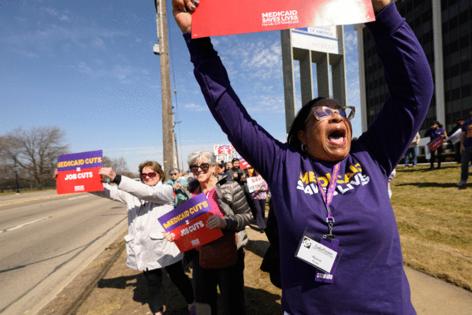Commentary: The case for racial equity in public health
Published in Health & Fitness
President Donald Trump’s administration has signaled its intent to eliminate programs that acknowledge and address racial disparities in health care. It has set out to defund reproductive health services, undermine Medicaid and dismiss public health data that highlights racial inequities.
If these policies continue unchecked, they will devastate communities like mine in the Mississippi Delta, where Black women already struggle to access life-saving cervical cancer screenings and the HPV vaccine.
A failure to invest in preventative health care does not just harm individuals — it also places a long-term financial burden on the public. Mississippi currently has the highest rate of amputations in the country due to a high incidence of peripheral artery disease and other health problems that could be mitigated with better access to healthy foods and preventative outreach and health services.
Similarly, cervical cancer is one of the most preventable and treatable cancers when detected early, yet nearly 4,000 women in the United States die from it every year. Mississippi leads the nation in cervical cancer rates — Black women in the state are nearly 1.5 times more likely to die from this disease than white women, and the disparities only widen with age, leaving older Black women especially vulnerable.
Early detection and treatment save lives and reduce the overall financial strain on the health care system. Cutting funding for these programs only ensures that more people will require expensive, late-stage treatments that could have been avoided altogether. This is not just a public health crisis — it is a human rights failure.
The Mississippi Delta has long been a region of both hardship and resilience. For generations, Black communities here have fought to carve out better futures despite entrenched racial discrimination in health care, education and economic opportunity. They have led efforts to dismantle inequitable systems and demand the quality of care that all people deserve.
Yet deeply held biases about Black women continue to prevent access to quality care. Studies have shown that health care providers routinely dismiss or override Black women’s choices, assuming they do not fully understand or cannot make informed decisions about their health. The legacy of forced sterilization, birth control experiments and lack of informed consent in medical procedures also contribute to Black women’s hesitancy to seek care. And the stereotype that Black women can endure more pain or do not need the same level of medical intervention persists, causing their concerns to be ignored.
These biases are not relics of the past. They are present in the dismissal of Black women’s symptoms, the chronic underfunding of health programs serving Black communities and the continued reluctance to invest in solutions that address racial disparities in health outcomes.
At the Southern Rural Black Women’s Initiative (SRBWI), we are working to change this reality. Our participatory research project, conducted in collaboration with Human Rights Watch, has centered the voices and experiences of Black women in the Mississippi Delta. In January, SRBWI released its latest report, “No Excuse: Inadequate Cervical Cancer Prevention and Care for Black Women in the Mississippi Delta,” which highlights the persistent inequities in health care access and outcomes.
The findings in “No Excuse” demand urgent action. We call on state and federal leaders to expand Medicaid to provide affordable health care access; increase funding for cervical cancer screenings and treatment programs; invest in transportation infrastructure to connect rural communities to health care facilities; and launch public education campaigns to increase HPV vaccination rates and cervical cancer awareness and screenings.
We extend our deepest gratitude to the community-based researchers from Washington, Bolivar and Humphreys Counties in Mississippi who made this report possible, as well as to the 159 women interviewed who courageously shared their stories. Their voices are a powerful reminder that we cannot stand by while preventable deaths continue to devastate Black communities.
This administration’s attack on public health and refusal to address disparities in health outcomes is an attack on the fundamental right to health care. We can and must resist these dangerous policies.
____
Sarah Bobrow-Willams is program director for Participatory Research and Community Assets at the Southern Rural Black Women’s Initiative. This column was produced for Progressive Perspectives, a project of The Progressive magazine, and distributed by Tribune News Service.
_____
©2025 Tribune Content Agency, LLC.










Comments